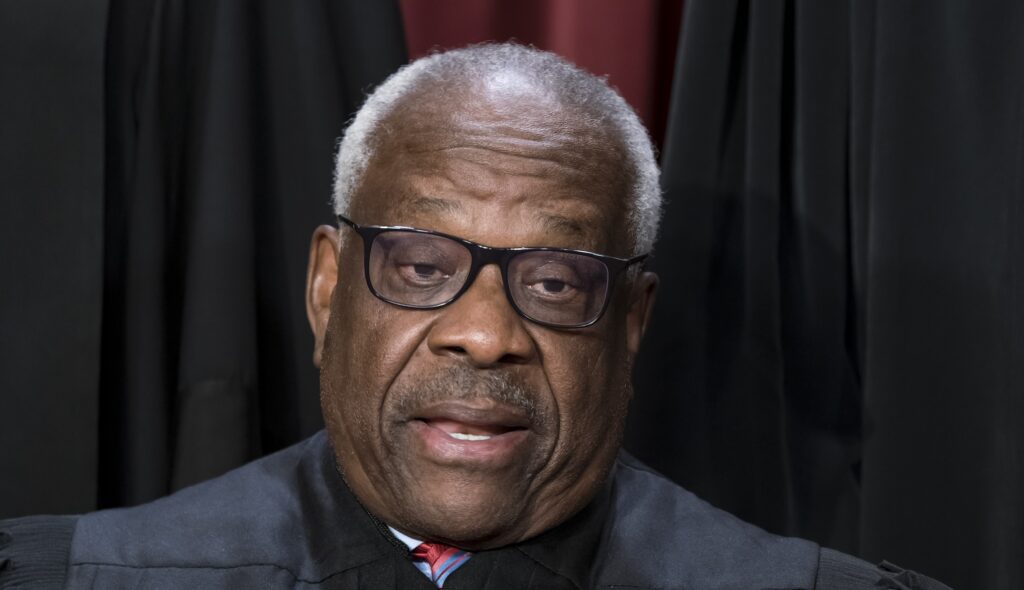
Supreme Court justices and federal judges will not be required to file public disclosure records when they eat or stay at someone else’s personal residence, according to a recent rule revision from the federal judiciary’s policymaking arm.
The U.S. Judicial Conference’s Committee on Financial Disclosure announced the newly revised ethics rule Monday. It alters certain disclosure requirements for Supreme Court justices and federal judges, allowing them to avoid reporting stays or meals at personal residences even if the property is owned by a business entity. The updated rule amends a 2023 regulation that made it more difficult to avoid reporting gifts, meals, and trips.
The revision this week comes amid partisan scrutiny of the judiciary’s ethics practices, provoked in part by Democrats dissatisfied with the 6-3 Republican-appointed majority on the Supreme Court. Many of these ethical gripes have resulted in critics targeting Justice Clarence Thomas over his vacations and stays at properties owned by his friend, Dallas-based real estate magnate Harlan Crow.

Under the new rules, judges, including members of the high court, will not be required to disclose whether they stayed or dined at a friend’s home or property. However, transportation gifts, such as travel aboard a private aircraft, will likely still need disclosure.
Jonathan Adler, a professor at Case Western Reserve University Law School, told the Washington Examiner the Judicial Conference’s revision brings the standards “more in line with the way the rule had traditionally been applied and understood.”
Notably, the rule change comes just days after an Alaskan man with a record of donations to Democratic-leaning groups sent hundreds of violent threats to members of the Supreme Court, according to a criminal affidavit.
The change “may also be a reaction to concerns about the need to balance privacy concerns with transparency concerns,” Adler noted.
Left-leaning critics were quick to judge the Judicial Conference for its sudden adjustment of the disclosure rules.
Donald Sherman, chief counsel for Citizens for Responsibility and Ethics in Washington, a group that tried to remove former President Donald Trump from the 2024 ballot, said the Judicial Conference “might as well call it the Clarence Thomas exemption.”
Judicial ethics have also been a major discussion point since last year’s announcement of a formal code of conduct for justices. However, the code, while groundbreaking, lacked any real enforcement mechanisms, leaving mostly Democratic critics dissatisfied by the high court’s conservative bend unhappy with the update.
The updated disclosure rules aim to “clarify” when gifts and hospitality need to be reported. The new regulations specify that judges do not need to disclose stays at personal residences owned by entities, as long as those properties are not commercially rented out.
“For gift reporting only, any food, lodging, or entertainment received as ‘personal hospitality of any individual’ (as defined in Guide, Vol. 2D, § 170) need not be reported,” according to the updated section labeled “Exclusions.”
Sen. Sheldon Whitehouse (D-RI), a Democratic lawmaker who has been vocal about tightening judicial ethics, was one of the key figures urging the 2023 reforms.
Whitehouse boasted Tuesday in a post on X that the Judicial Conference “has moved to clean up messes I have pointed out” on at least two occasions. But now, the only hope he has to reinstate the stricter rules is to pass his long-touted Supreme Court Ethics and Transparency Act, which would allow members of the public to file complaints against justices and create a panel of lower court judges with subpoena powers to investigate.
Vice President Kamala Harris said this week that she was open to eliminating the 60-vote filibuster in the Senate, a move that could allow for the easy passage of more radical policies, such as creating enforceable ethics codes on the Supreme Court or even forcing the longest-serving members into retirement. Thomas is the most senior of the nine justices.
CLICK HERE TO READ MORE FROM THE WASHINGTON EXAMINER
Thomas previously defended his actions, claiming he had been advised that stays at properties such as Crow’s Camp Topridge in New York did not need to be disclosed, as they fell under the personal hospitality exemption. Despite public pressure, including impeachment threats from progressive lawmakers such as Rep. Alexandria Ocasio-Cortez (D-NY), Thomas and the Supreme Court have otherwise largely remained silent on these ethical concerns.
With the latest revisions, the debate over the ethical standards of the U.S. judiciary is likely to endure as Election Day approaches, as Democrats have sought to tie their distaste for the high court’s rulings into their 2024 campaign strategy.




